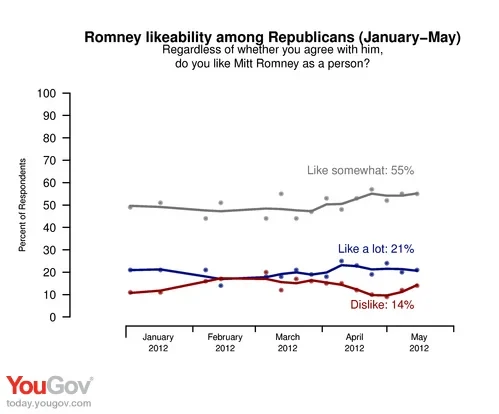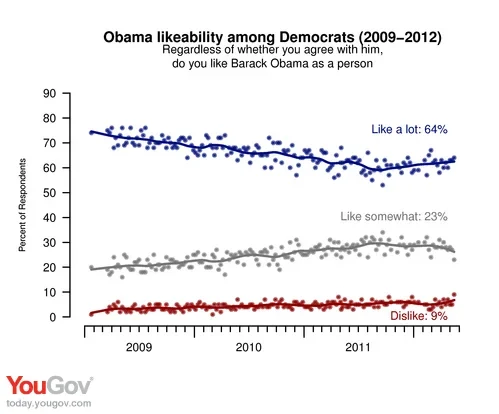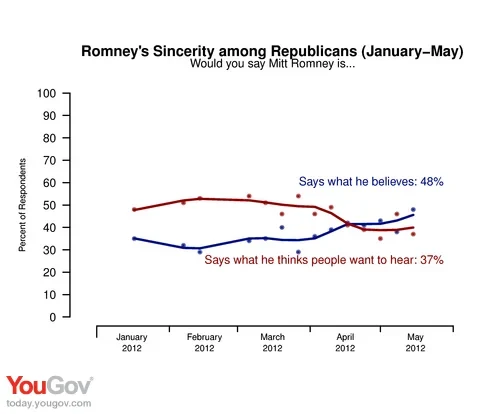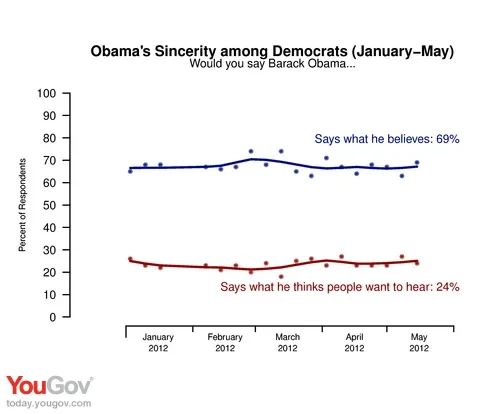Throughout the primary season, one of the chief obstacles that Mitt Romney faced was a palpable lack of enthusiasm for his candidacy among the Republican grassroots. At best, a substantial part of the Republican electorate was lukewarm toward his candidacy; at worst, it was downright hostile. As the campaign season unfolded, GOP elites wrestled with the question of whether skepticism of Romney among Republican voters would hurt their party's chances in November. The conclusion to which most GOP politicos came was that, while the tepid response to Romney by Republicans was not a good sign, it would ultimately fade in importance. Once Romney became the only man left standing, Republicans would unite around him in their efforts to defeat Obama. In the process, old concerns about Romney's ideological bonafides and trustworthiness would more-or-less disappear.
Now that the primary campaign is over and Mitt Romney has enjoyed several weeks as the party's presumptive presidential nominee, we can begin to look at the polls to get a sense of the extent to which the Republican electorate is coming around to Romney. Is Romney's image among Republicans changing now that no viable challenger to him is still around?
As the table below shows, Republicans are not feeling much warmer toward Romney as a person today than they did several months ago. In early January, half of Republicans indicated that they like Romney somewhat, and another 20% indicated they like him a lot. Those percentages have barely changed.

The extent to which Republicans have warm feelings toward Romney looks pretty bad when you compare it to the extent to which Democrats have warm feelings toward Obama. The graphic below shows Obama likeability among Democrats since 2009, the year Obama became president. As can be seen, the percentage of Democrats who like Obama a lot has been gradually declining throughout much of his presidency, but it still registers at over 60% at last count. A strong majority of Democrats continues to have warm feelings about the president (but, of course, not many others do).

Republicans also continue to be much more suspicious of Romney and his true colors than Democrats are of Obama, though this might be beginning to change. Throughout the early part of the year, a greater percentage of Republicans claimed that Romney "says what he thinks people want to hear" than claimed that he "says what he believes." But some Republicans appear to have changed their minds on this question in recent weeks. In the latest survey, nearly half express the view that Romney says what he believes. This has occurred despite the fact that Romney has already begun to moderate his positions on some important issues, including immigration reform, student loans, and others. It would appear, therefore, that as some Republicans come around to accepting Romney as their nominee, they are changing their views of him accordingly.

Democrats, on the other hand, have been steadfast in their beliefs about the president's sincerity. In the last Economist/YouGov poll, 69% answered that he says what he believes. As the graphic below shows, this percentage has remained remarkably stable over the last several months.

Thus, early results suggest that Republicans' attitudes toward Romney have shifted a bit as it has become clear that he will be the party's nominee, though not that much. For the most part, attitudes about Romney among Republicans appear to have stabilized and seem unlikely to move greatly in the near future. Old concerns have certainly not disappeared. Still, these lingering concerns may not matter so much. Republicans may not like Romney a lot, but they appear to like him enough. And they certainly don't like Obama, which appears to be the far more important motivating factor for them in this election.









